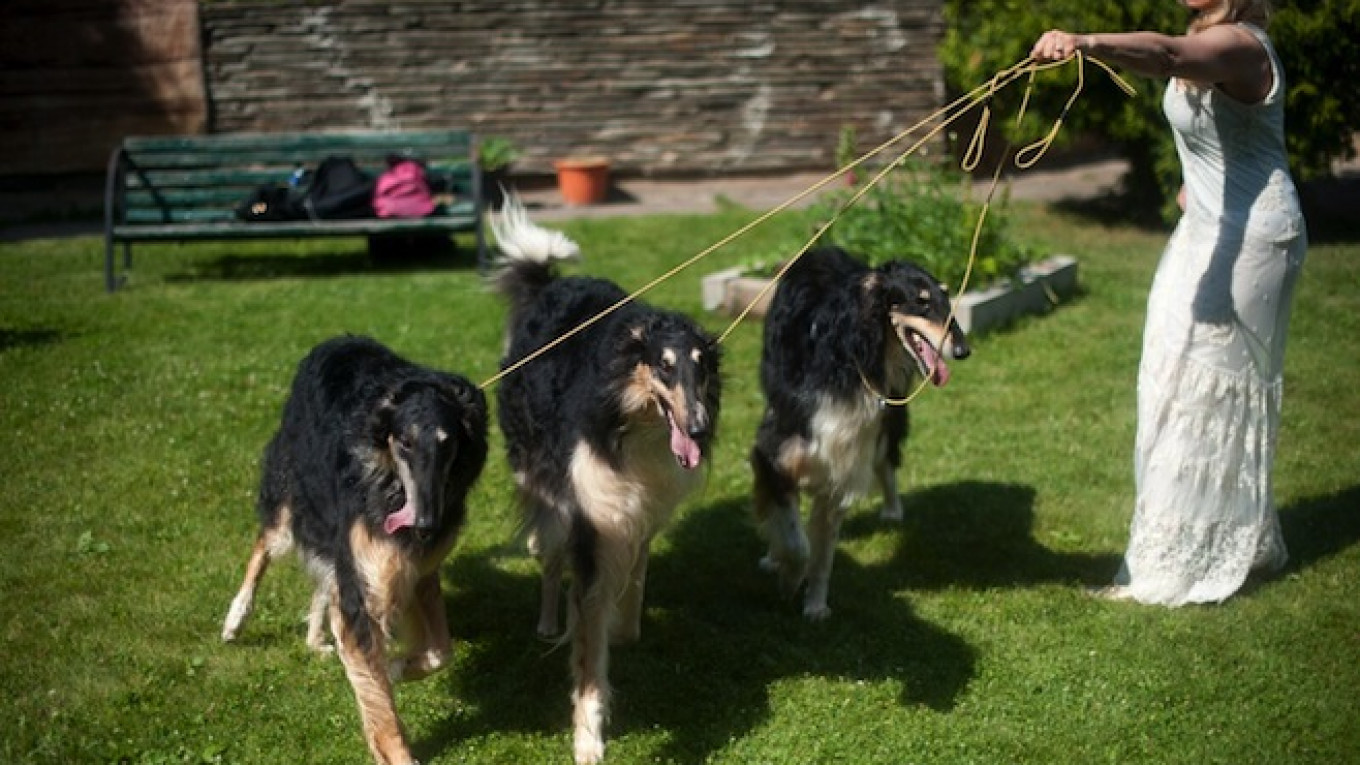The borzoi, also known as the Russian wolfhound, was first bred during the reign of Ivan the Terrible in the 15th century. Since then, the dog has become an important part of Russian culture and history, associated with the grandeur of imperial Russia.
Many borzoi owners today speak of the breed’s connection to Russia’s past as part of its appeal.
“This dog, like the Russian soul, is multifaceted,” said Natalya Uvarova, who raises borzois at her farm Iz Razdolia outside Moscow. “From one side, it is subtle and obedient, from the other — it’s a killer, a skillful hunter!”
See also: Q&A With a Borzoi Dog Breeder
Uvarova cited the breed’s ties to imperial Russia as one reason for her interest in them.
When Uvarova and other borzoi owners speak about the dogs, they use old Russian words for muzzle, tail and hair — another indication of their longing for Russia’s imperial past.
Yelena Isayenkova, who lives with her borzoi in the central Russian town of Yaroslavl, said that she sees the dogs as a connection to the power and grandeur of imperial Russia. “This dog has suffered as much as the Russian people. I’m sorry these noble times have passed — I want them back! That’s why I bought a puppy five years ago,” Isayenkova said.
Soviet power interrupted the natural course of Russian history, Isayenkova? added, saying that returning to its imperial roots could “save Russian society from degradation.”
The dogs were indeed popular with the royal family, who used them to hunt. Peter II had around 400 borzois, which he used to hunt hares, foxes and wolves. Alexander II gave borzoi puppies as gifts to his friends, including Prince Charles of Prussia and the Prince of Wales.
Grand Duke Nicholas Romanov, a cousin of the last tsar, founded an estate for borzois in the Tula region in 1887. Known as Pershino, more than 130 borzois lived among a total of 400 dogs on the property until it was closed in 1914.
The dogs were also featured in classic Russian literature. In his 1841 novel Dubrovsky, poet Alexander Pushkin wrote: “The owner and the guests went to the kennel yard, where more than 500 greyhounds and borzois lived in contentment and warmth, praising the generosity of Kirill Petrovich in their dog’s language.”
When the Bolsheviks seized power in 1917, the borzoi’s connection to the nobility was so strong that many dogs were killed along with their owners. Some Russian nobles who fled the revolution took their dogs with them into exile, and some of today’s emigrants also own borzois.
“For me my borzoi dog is the connection to my homeland,” said Anna Gabrysch, who immigrated to Germany from Pskov.
Hans Saxer, a German businessman, also told The Moscow Times that he owned a borzoi because it was a Russian breed.
“I came to Russia to buy a borzoi in 1995, because my father, a German soldier, died at Stalingrad in 1942,” Saxer said. He added that the dog’s “melancholic” eyes show its Russian soul.
Contact the author at artsreporter@imedia.ru
A Message from The Moscow Times:
Dear readers,
We are facing unprecedented challenges. Russia's Prosecutor General's Office has designated The Moscow Times as an "undesirable" organization, criminalizing our work and putting our staff at risk of prosecution. This follows our earlier unjust labeling as a "foreign agent."
These actions are direct attempts to silence independent journalism in Russia. The authorities claim our work "discredits the decisions of the Russian leadership." We see things differently: we strive to provide accurate, unbiased reporting on Russia.
We, the journalists of The Moscow Times, refuse to be silenced. But to continue our work, we need your help.
Your support, no matter how small, makes a world of difference. If you can, please support us monthly starting from just $2. It's quick to set up, and every contribution makes a significant impact.
By supporting The Moscow Times, you're defending open, independent journalism in the face of repression. Thank you for standing with us.
Remind me later.


